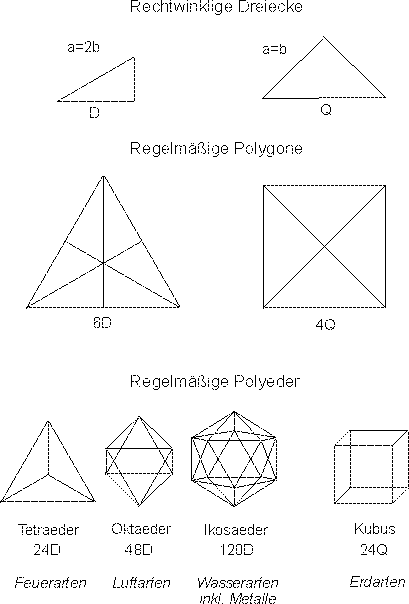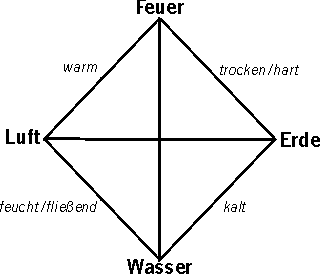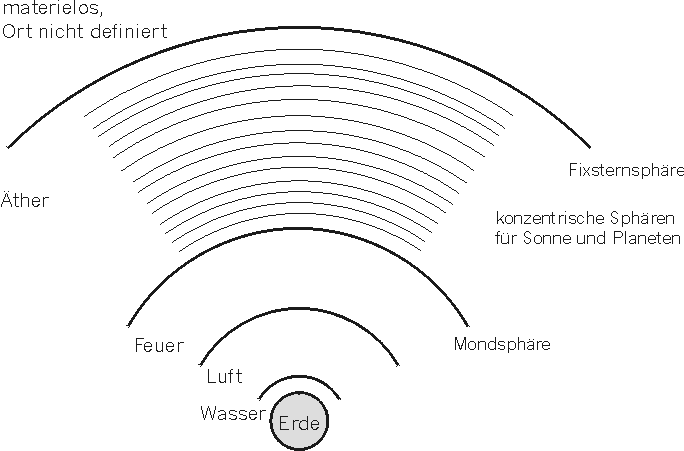
Einführung in die Geschichte und Philosophie der Chemie
Kooperationsveranstaltung der Fakultäten für Chemie und für Geistes- und Sozialwissenschaften der Universität Karlsruhe (TH)
1. Vorlesung:
Chemie als spekulative Naturphilosophie in der griechischen Antike: |
Copyright Ó 2000 by Joachim Schummer
2.1 Die einfache Fassung
2.2 Das Problem der Veränderung und seine atomistische Lösung
2.3 Defizite des Atomismus: Materiebegriff und leerer Raum
3.1 Der mathematisch-ästhetische Ansatz
3.2 Molekulartheorie und Reaktionsmechanismen
3.3 Die weitere Bedeutung des Ansatzes
4.1 Formphilosophie versus Stoffphilosophie und das Problem der Stoffidentität
4.2 Die begriffliche Herleitung der Elementenlehre
4.3 Die Erklärungstauglichkeit des Ansatzes
4.4 Elementumwandlung und Erste Materie
4.5 Der hylemorphe Aufbau der Welt
4.6 Kosmologische Schichtentheorie
| Wichtige Personen:
Empedokles (ca. 483-424) Demokrit (460-371) Platon (427-347) Aristoteles (384-322) |

| Stoffprinzip | Formprinzip | konkreter Gegenstand |
| Erste Materie
(eigenschaftslos) |
Grundqualitäten | Elemente |
| Elemente | Mischungsverhältnisse | homogene Stoffe |
| homogene Stoffe | räumliche Verteilung | heterogene Stoffe |
| heterogene Stoffe | Gestalt (Funktion) | Gebilde
(z.B. Körperorgane) |
| Körperorgane | Funktionsplan | Körper |
| Körper | Seele (Bewegungsprinzip) | Lebewesen |
| Fixsternhimmel | erstes Bewegungsprinzip (Gott) | ewige Himmelsbewegung |

McDonnell, John J.: The Concept of an Atom from Democritus to Dalton, E. Mellon Press, Queenston 1991.
Pabst, Berhard: Atomtheorien des lateinischen Mittelalters, WBG, Darmstadt 1994.
Pullman, Bernard: The Atom in the History of Human Thought, Oxford Univ. Press, New York 1998.
Pyle, Andrew: Atomism and Its Critics from Demokritos to Newton, Thoemmes, Bristol 1995.
Cornford, Fr.: 1937, Plato’s Cosmology, Routledge and Kegan Paul, London.
Friedländer, P.: 1949, ‘Structure and Deconstruction of the Atom According to Plato’s Timaeus’, University of California Publications in Philosophy, 16, 225-248.
Pohle, W.: 1971, ‘The Mathematical Foundations of Plato’s Atomic Physics’, Isis, 62, 36-46.
Rex, Fr.: 1989, ‘Die Älteste Molekulartheorie. Zu Platons quasichemischem Gedankenspiel im Timaios (um 360 v.Chr.)’, Chemie in unserer Zeit, 23, 200-206.
Visintainer, J.R.: 1998, ‘An Infinity of Different Triangle Types: On the Chemistry of Plato’s Timaeus’, Hyle, 4, 117-128.
Böhme, G.: 1980, ‘Aristotelische Wissenschaft. Aristoteles’ Chemie: eine Stoffwechselchemie’, in: ders., Alternativen der Wissenschaft, Kap. III.2, Frankfurt/M. (Suhrkamp), S. 101-120.
Bolzan, J.B.: 1976, ‘Chemical Combination according to Aristotle’, Ambix, 23, 134-144.
Bolzan, J.B.: 1980, ‘Justification de la mixis en Aristoteles’, Archives internationales d’histoire des sciences, 30, 27-35.
Claghorn, G.S.: 1954, Aristotle’s Criticism of Plato’s "Timaeus", The Hague.
Düring, I.: 1944, Aristotle’s Chemical Treatise: Meteorologica, Book IV, Göteborg (Nachdruck: New York/London 1980).
Happ, H.: 1965, ‘Der chemische Traktat des Aristoteles. Meteorologie IV’, in: H. Flashar, K. Gaiser (Hg.): Synusia. Festschrift für Wolfgang Schadewaldt, Pfullingen, S. 289-322.
Happ, H.: 1971, Hyle - Studien zum aristotelischen Materiebegriff, Berlin/New York.
Horne, R.A.: 1975, ‘Die Chemie des Aristoteles’, in: G.A. Seek (Hg.): Die Naturphilosophie des Aristoteles, Darmstadt (WB), S. 339-350.
Joachim, H.H.: 1904, ‘Aristotle’s Conception of Chemical Combination’, Journal of Philology, 29, 72-86.
Lewis, F.A.; Bolton, R. (Hg.): 1996, Form, Matter and Mixture in Aristotle, Oxford (Blackwell).
Lloyd, G.E.R.: 1964, ‘The Hot and the Cold, the Dry and the Wet in Greek Philosophy’, Journal of Hellenic Studies, 84, 92-106.
McMullin, E.: 1978, ‘The Concept of Matter in Transition’, in: ders. (Hg.): The Concept of Matter in Modern Philosophy, Notre Dame-London (University of Notre Dame Press), S. 1-55.
Oldroyd, D.R.: 1976-77, ‘The Doctrine of Property-Conferring Principles in Chemistry - Origins and Antecedents’, Organon, 12-13, 139-155.
Schummer, J.: 1996, Realismus und Chemie. Philosophische Untersuchungen der Wissenschaft von den Stoffen, Würzburg, Kap. 4.
Seeck, G.A.: 1964, ‘Über die Elemente in der Kosmologie des Aristoteles. Untersuchungen zu De Gen. et Cor. und De Caelo’, Zetemata, 34.
Sharvy, R.: 1983, ‘Aristotle on Mixtures’, The Journal of Philosophy, 80, 439-457.
Sokolowski, R.: 1970, ‘Matter, Elements and Substance in Aristotle’, History of Philosophy, 8, 263-288.
Stéphanidès, M.: 1924, ‘Une théorie chimique d’Aristote. Contact et affinité’, La Revue Scientifique, 62, 626-.
Strube, I.: 1974, ‘Aristoteles und die Krise in den Lehren über chemische Vorgänge", in: E.C. Welskopf (Hg.): Hellenische Poleis. Krise - Wandlung - Wirkung, Bd. 4, Berlin, S. 1839-1849.
Lippmann, E.O. v.: 1910, ‘Chemisches und Alchemisches aus Aristoteles’, Archiv für Geschichte der Naturwisssenschaften und der Technik, II, 233-300.
(Siehe auch Literatur zur parallelen Physikvorlesung)